The ZIP CodeTM of my childhood.


On August 12, 2021, the United States Postal Service issued “Backyard Games,” sure to appeal to the nostalgic baby boomer like me.
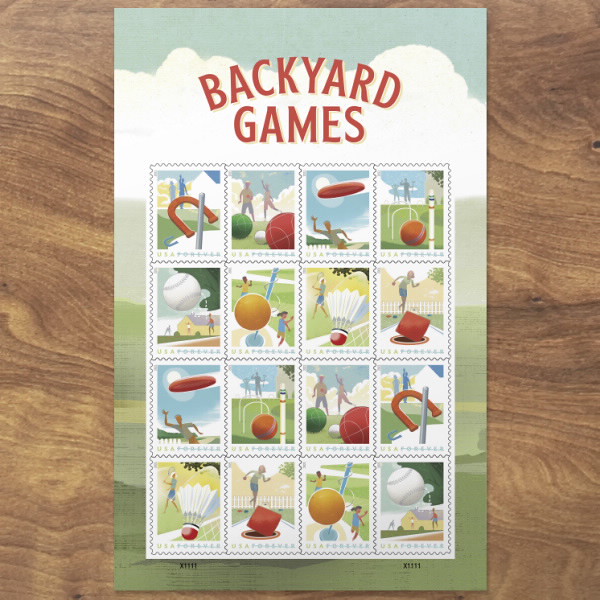
Per USPS:
The stamp pane features eight unique designs illustrating eight backyard games:
- badminton
- bocce
- cornhole
- croquet
- flying disc
- horseshoes
- tetherball
- variation on pick-up baseball
Each design emphasizes the movement of the game pieces, giving a dynamic quality to the artwork, with a simplified style that evokes the nostalgic feeling of playing backyard games as a child.
Later my brother scanned some old slides, likely taken when he was home from the Army. They included photos of two of my aunts and me playing Pop-A-Lot, a backyard game from Tupperware I’d half forgotten.
Our trailer was at the end of a row, with a field beyond. My dad and the trailer park owner had an understanding. We could use the field next to the trailer rent free if we were willing to mow and maintain it. Our yard on the other side was small and shrank more when my dad planted a shed in the middle of it, so this was a great perk.
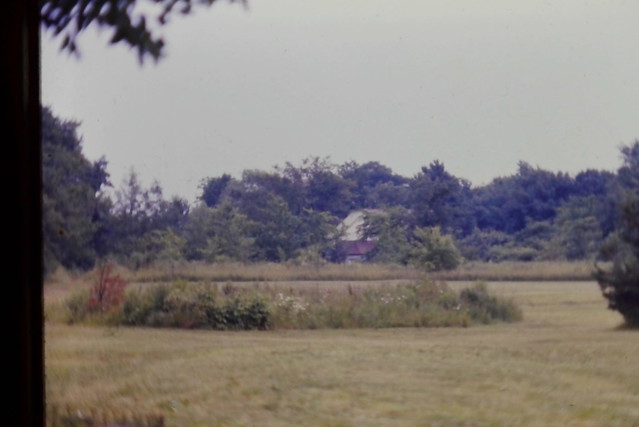
The field offered us two to three times the space, up to the point it turned into an uneven, weedy, wet depression. My dad had borrowed a glider, which he put on that side of the trailer along with a table and umbrella. (Later he moved them behind the shed for shade. Your choices were roast in the sun all afternoon on one side, or get eaten alive in the evening shade by mosquitoes on the other.)
Dad put up a trellis or two for morning glories and, later, a wild rose he dug out of the wet depression. He got enormous tires to use as raised flowerbeds. He planted a rectangular garden with flowers like zinnias and vegetables like bell peppers, anchored by Virgil’s Arbor Day ash tree at the southwest corner.
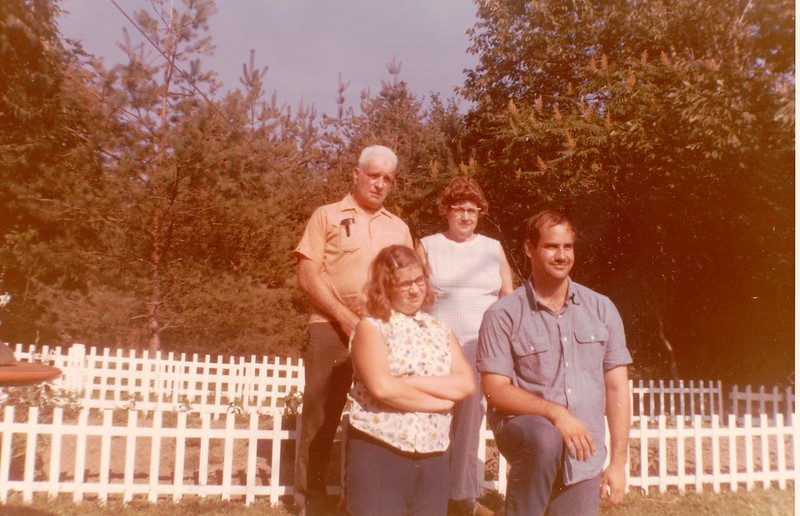

A light pole next to the trailer sported a board with horseshoes tacked to it. I have no idea where they came from. We may have used them once or twice. I loved the idea of having horseshoes, once associated with luck, and wondered if ours had been worn by a horse.
Of course we tossed a flying disc around (maybe a Frisbee). We played badminton; I remember I hit the birdie too hard like it was a tennis ball. Virgil and his friends played a few games of pick-up baseball and even flag football. They were surprised that I could sometimes hit the ball almost as far as the woods. Not bad for a girl eight years younger than her brother and his friends. The trailer park also had a basketball hoop stuck to a light pole in the field. The last time the basket went missing it wasn’t replaced. By then, most of the people who would have used it were gone.
The backyard games we played that aren’t on the list: Jarts and Pop-A-Lot.
The last (and possibly first) time we broke out Jarts, my brother (if I recall correctly) speared the top of his friend’s foot. It was quite gory.
Pop-A-Lot’s packaging said:
Could “safe” has been in response to Jarts, which were as unsafe as anything could get?
I recall it was fun. It looks like my dad’s sisters liked it too (as long as it didn’t muss their hairdos).
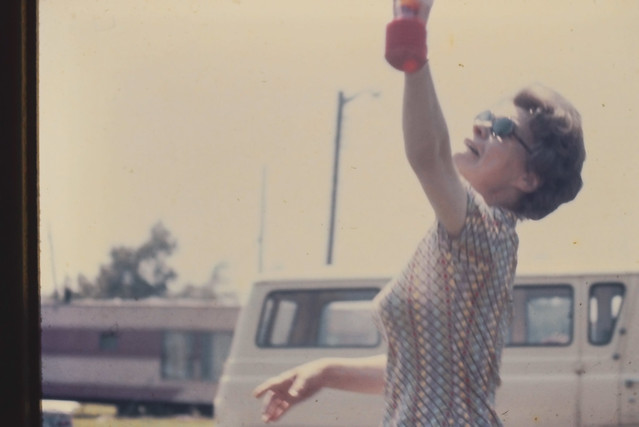

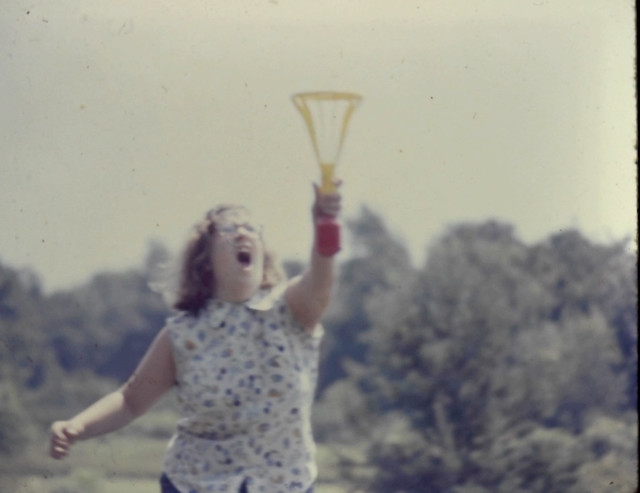
Although it wasn’t a game, the other backyard activity we indulged in involved water. For a while I had a wading pool — two, actually, one boat shaped and the next round. I outgrew both quickly. We also had a sprinkler attachment for the hose that spun around — it was great fun. The only reason I can think of for not using it more was not wanting to waste too much water.
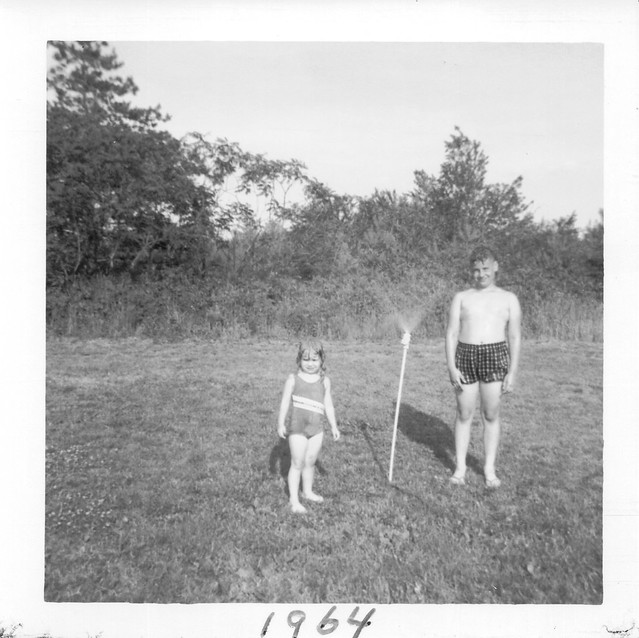

Sadly, by the time I was old enough to play some of these games, my brother had left for the Army, and his friends had dispersed to begin their own futures. The demographic of the trailer park changed, too, with the families moving out and retirees trying to stretch their pensions moving in.
The Forest Preserve District of Will County’s “Winter Wonderland” at Messenger Woods reminded me of Pop-A-Lot and backyard games, even if they weren’t all “real” games. I could see myself working to consistently get a plushie snowman’s head into a basket on my head. After all, it’s fun, safe, and develops coordination.
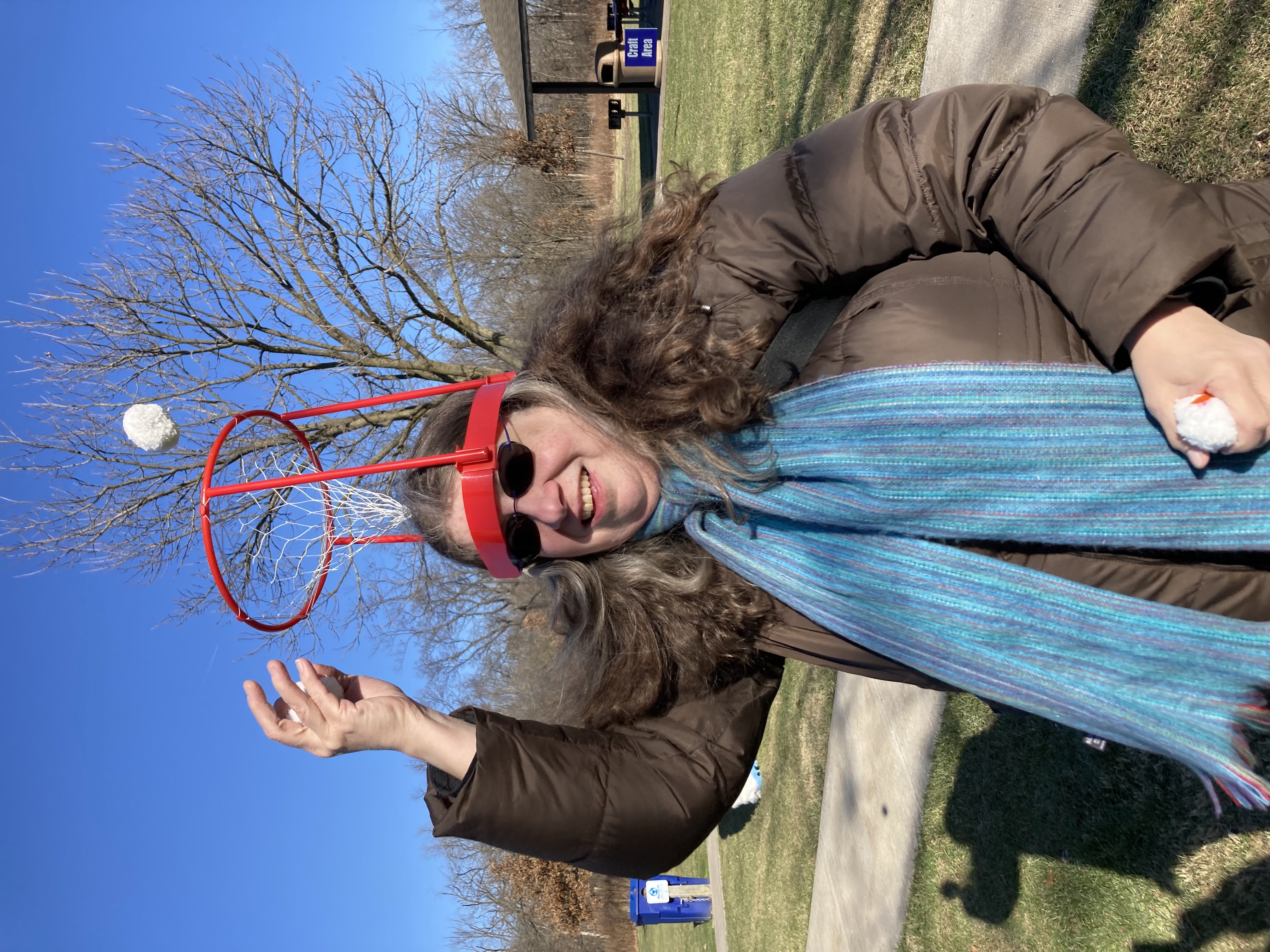
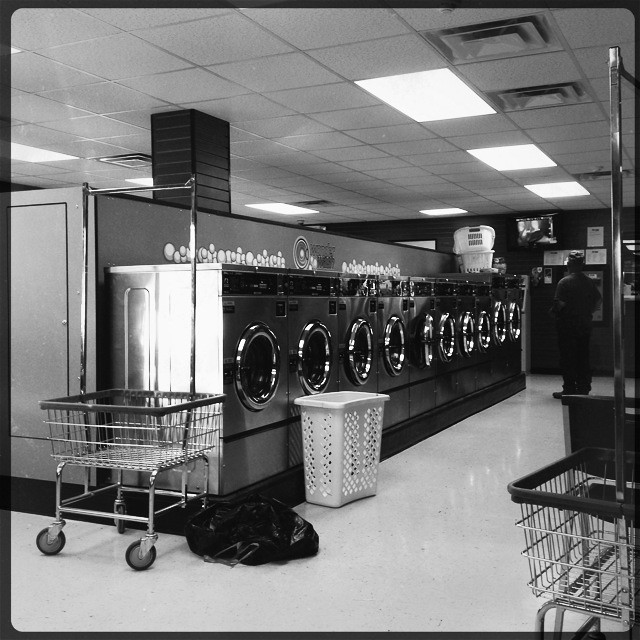
According to the Hyde Park Herald, Hyde Parkers who don’t have laundry facilities in their house or building now have to go outside the neighborhood for clean clothes.
Harper & 53rd Launder Koin, the last laundromat in Hyde Park, is closing for good on Tuesday.
The property, located at 5230 S. Harper Ave., is being purchased by the University of Chicago. According to co-owner Josh Hwang, Launder Koin’s last day in operation is technically Feb. 28, but “residents should try and get their laundry done before Feb. 26.”
The laundromat has been operating off 53rd Street since 2002, predating large nearby developments like Harper Court. Back then, Hwang was only 13 years old and working at the business for his parents.
Though demand for laundromats has dwindled nationwide in the last decade, Hwang said Launder Koin still services between 500 to 1,200 people a month.
I’ve wondered if I should do a “Relics” post on the institution of the laundromat, but it never seemed to be the right time. After seeing this article in the Hyde Park Herald, I figure the right time is now. The laundromat is on its way to becoming a relic, and may be for many years.
I grew up in a trailer — no dishwasher, no washer, no dryer. My understanding is in the trailer park’s early days the women did the laundry in the building “down front” (the entrance from Rte. 20). There may have been an informal “laundry day” (Tuesday? Wednesday?). The building was shut up by the time I was old enough to peer through its grimy windows and appeared to be junk storage.
Later, my dad, the only licensed driver, took the laundry to a laundromat on South Lake Park Avenue (6000? 6150?) in Hamburg on Saturdays, mostly by himself. I think it was on one occasion when I went with him that a woman asked him, with his shock of almost snow-white hair, about his cute granddaughter. “That’s my daughter,” he corrected her. I’m sure the women at the laundromat looked at him with newfound respect after that.
Winter trips took longer because he had to dry everything at the laundromat. I tried to dry jeans once or twice in winter air, but discovered they could break (tear) when frozen.
In finer weather, the wet clothes and sheets came home so we could hang them on the clotheslines. After a few hours in the breeze, they really did smell great. They also could pick up bird droppings, stains from falling wild cherries, or, worst of all, in late spring, tent caterpillars. Around May a plague of them would infest the cherry trees over the trailer and clotheslines. You hoped to pick them off so you wouldn’t find any, or parts of any, on your clothes or bedclothes later.
I imagine the laundromat could be a social place, with regulars on Saturday morning who exchanged greetings and maybe chat — with no phones or devices to distract them. Of course, you could always step out and go to a nearby store. It wasn’t likely at that time your clothes would go missing.
After I came to the university, I didn’t need to use a laundromat. The dormitory had washers and dryers, and my apartments since have had on-site laundry machines. The first was tough — I lived on the fourth floor, and the machines were on the first. There weren’t enough, so I could go down and up the stairs several times before one was free. It used a quaint honor system. You were supposed to plug the machine you used into an electrical outlet associated with your meter. It was fascinating to me to watch the meter move with the increased load. It wasn’t so fascinating when you found someone else’s laundry running up your meter.
At the next apartment, a studio, the small laundry room was slightly below ground level in the next building, and served at least a couple of buildings. In rain, snow, or cold, I’d have to dress for the weather, carry the laundry through the courtyard and a bit down the street, pass through a gate, go down steps mostly too dark to see in the alley, and hope for the best. Then repeat back and forth until all the laundry was washed and dried. I don’t miss that, especially when the weather was grim. It’s hard to get motivated to go out a half dozen or more times in wind, sleet, rain, snow, etc., especially on a day off. If I could drive and a laundromat had been an option, I’d have used it.
I’ve used laundromats twice in the last ten years that I can remember. The first was in Anna, Illinois, during a visit to Cache River and Shawnee National Forest. The other was in the college town of Geneseo, New York, while in the area to see Letchworth State Park.
The one in Anna was almost empty at maybe 8 p.m.; I recall the one in Geneseo was more crowded mid-day. Both seemed well kept, and the one in Anna gleamed with stainless steel machines.
Sadly, I have never been to the laundromat on 53rd — I’m not sure I knew it was still open. The next closest one is in Kenwood, prominently situated in a a plaza off the 47th Street exit of Jean-Baptiste Pointe DuSable Lake Shore Drive. I haven’t been in there, either, although I would need to wash heavier items there. It gets mixed reviews.
In my dad’s day, the big deal would be to have enough change — lots of change. No credit or debit cards, no Apple Pay, not even paper bills. If the price went up a quarter, naturally my dad grumbled. Inflation! To him and some of his peers, it didn’t seem an insignificant amount of money. “It adds up,” he might say.
Laundromats may not entirely disappear, just get farther and farther apart — like Hyde Park residents having to go six blocks further north into Kenwood. Five hundred to twelve hundred people a month aren’t insignificant numbers for a neighborhood. Some laundromats, like the one in Hyde Park, are family businesses. How long will future generations want to carry on the laundromat business in a rapidly evolving society that values money and technology?
Mr. McGuire: I want to say one word to you. Just one word.
Benjamin: Yes, sir.
Mr. McGuire: Are you listening?
Benjamin: Yes, I am.
Mr. McGuire: Plastics.
Benjamin: Exactly how do you mean?
Mr. McGuire: There’s a great future in plastics. Think about it. Will you think about it?
The Graduate
Substitute “laundromats” and you’ll see what I mean.
I eagerly await the Star Trek “garment reprocessor”/”cleaning processor.”
Worf: Before being allowed to play, he was to put his soiled clothing in the garment reprocessor.
Keiko: One night goes by . . . two . . . a week . . . ten days . . . by now there’s a pile of socks half a meter high!
O’Brien: Come on . . . it wasn’t half a meter.
Keiko: After two weeks I couldn’t stand it any more. I bundled them up and put them in the cleaning processor. And I’m still doing it.
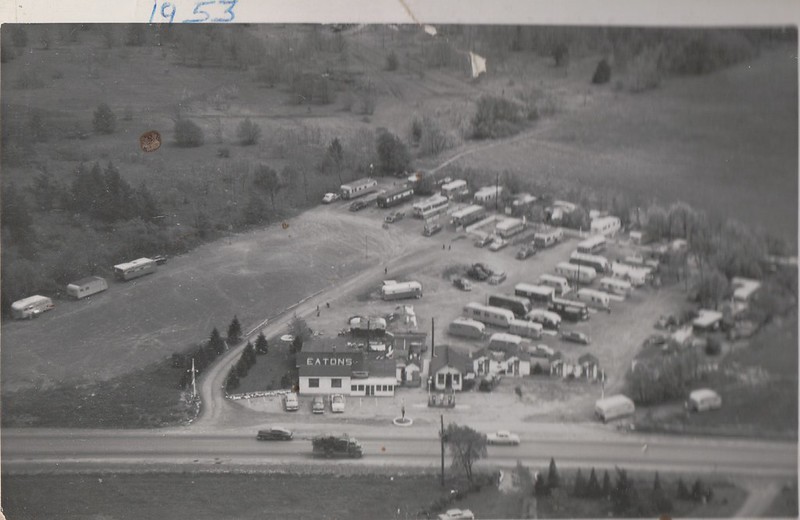
If these men were alive now, wouldn’t they be amazed by today’s prosthetics?
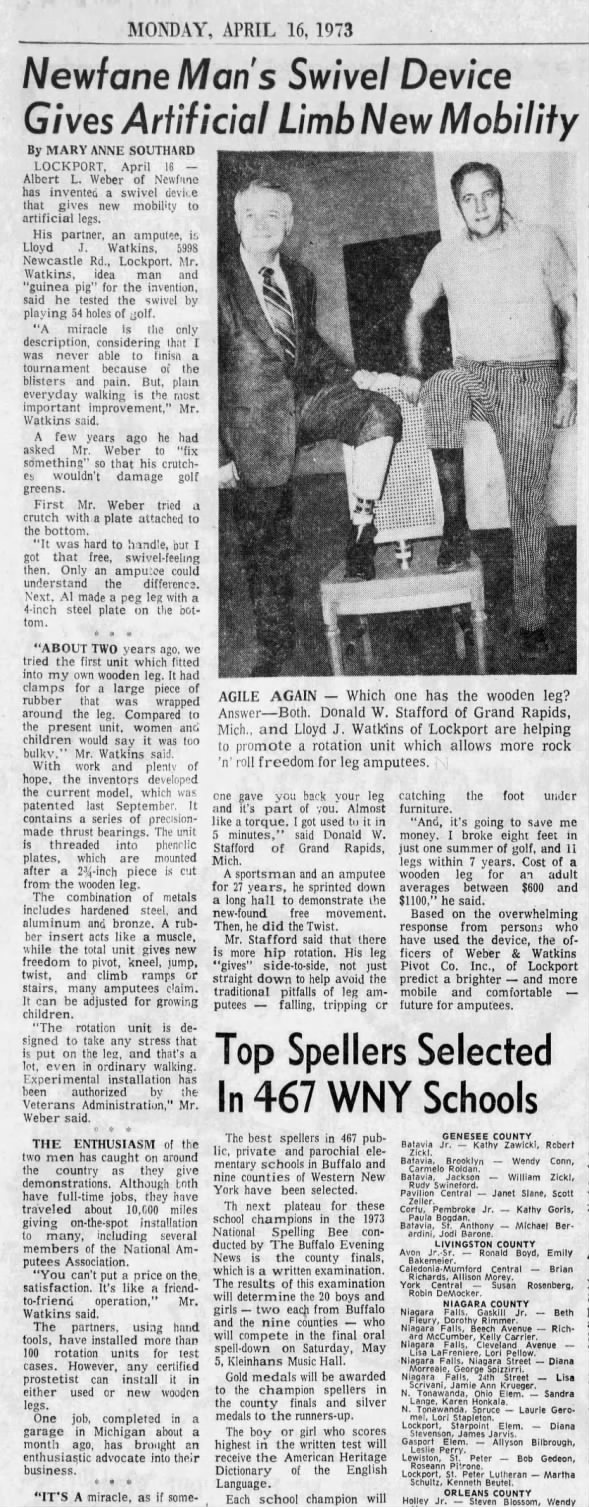
Christmas present for birders from the feeders at Sapsucker Woods (Cornell). The pileated woodpecker to your right (middle feeder on the post) is the male.
This is at Chestnut Ridge, a county park near where I grew up in western New York. I didn’t know about it until a few years ago. Sadly, the one time I was back there in 2015, my energy drained on the trail before I could get to the waterfall, so I’ve never seen it. I’m not sure my dad knew about it. He would have loved it, I think. Video is by John Kucko, who specializes in WNY/Finger Lakes photography and video.
From a Facebook post, snow totals from the recent storm in western New York, aka the Niagara Frontier. Hamburg is my hometown.
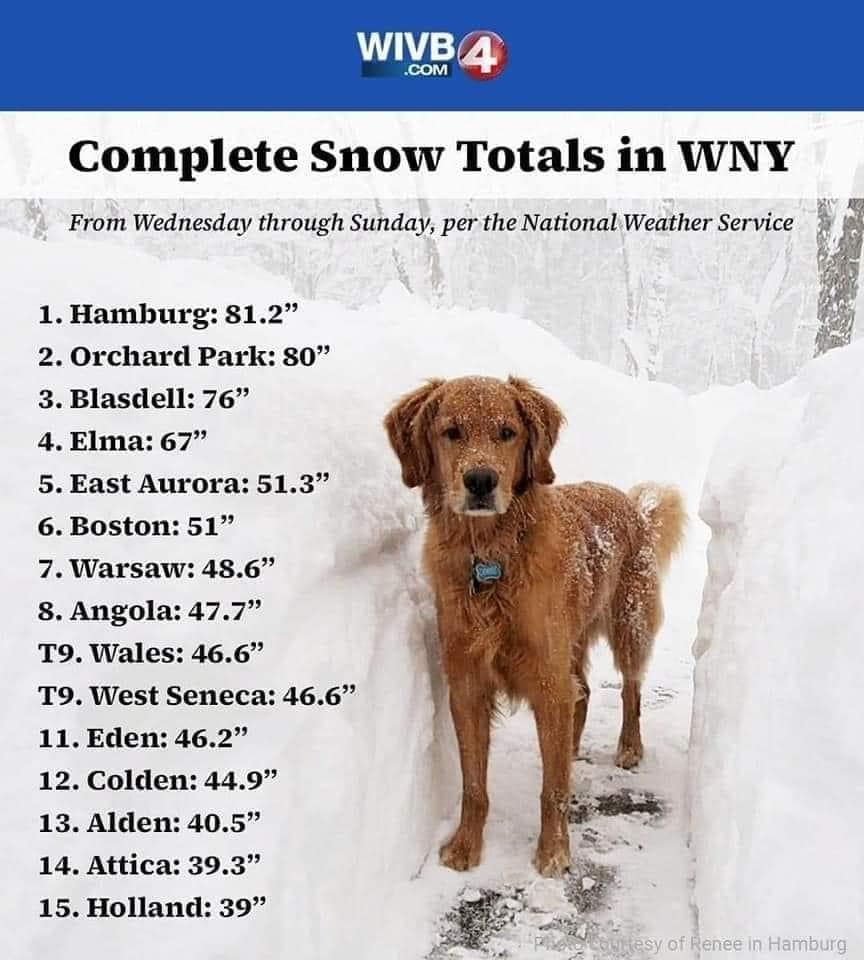
Same video at half speed. More relaxing.
My dad, persistently frustrated by cheap cameras, would be amazed by what you can do with something that fits into your pocket. He would be more amazed and likely appalled by how much such a thing costs. I know he’d envy my photos and videos of Letchworth, though. From late May 2015.